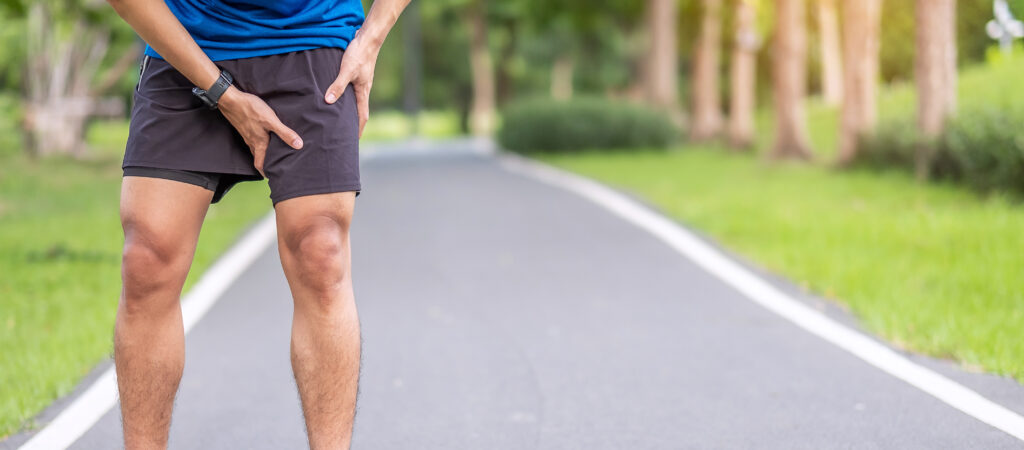
What is osteoarthritis of the hip?
Osteoarthritis (OA) is a degenerative joint condition that causes the cartilage in the hip joint to become thinner over time. This can lead to pain, stiffness, and reduced mobility. The hip is one of the most commonly affected joints.
OA is sometimes referred to as “wear and tear”, but it but it also involves the body’s attempt to repair joint damage.
Symptoms
- Pain in the groin, thigh, or buttock.
- Stiffness, especially in the morning or after rest.
- Difficulty walking, climbing stairs, or getting in/out of a car.
- Reduced range of motion.
- Clicking or grinding sensation in the hip.
- Pain that may disturb sleep.
Causes and risk factors
- Age: more common over 50 years old.
- Obesity: extra weight increases joint stress.
- Previous joint injury or surgery.
- Genetics: family history of OA.
- Developmental hip conditions in childhood (e.g. perthes).
- Repetitive stress on the joint (e.g. manual work, sports).
Diagnosis
OA of the hip is diagnosed through:
- Medical history and physical examination by your clinician.
- X-rays to assess the joints condition may be considered, if your symptoms are severe enough to consider surgery.
- MRI is rarely needed unless another condition is suspected.
Self-care and management
1. Exercise
- Regular, low-impact activity helps maintain joint function.
- Strengthening exercises support the hip and reduce pain.
2. Weight management
- Losing even a small amount of weight can reduce hip pain and improve mobility.
3. Pain relief
- Paracetamol or NSAIDs (e.g. ibuprofen) as advised – consider consulting your local pharmacist.
- Topical anti-inflammatory gels.
4. Joint protection
- Use cushioned footwear.
- Avoid prolonged standing or sitting if these aggravate your symptoms.
- Use walking aids if needed (e.g. stick or walker).
When to seek medical advice
- Pain interferes with daily life or sleep – Consider seeing your GP or self-referring to your local MSK service.
- You experience sudden worsening of symptoms – Consider seeing your GP.
- You have sudden difficulty walking or standing or pain commences following a traumatic fall or injury – Attend your local Emergency Department (A&E).
Further treatment options
- MSK Rehabilitation: Tailored exercise programs to improve your joint strength, flexibility and overall MSK health can be developed with you with the aim of improving your day-to-day function.
- Steroid injections are sometimes used to manage the inflammation associated with osteoarthritis.
This is an anti-inflammatory delivered directly to the joint and treats the symptoms of osteoarthritis but does not resolve the joint cartilage changes.
Some people see good benefit from injections, however the more advanced the changes are in the joint, the less likely you are to see benefit.
- Surgery: hip replacement may be considered if symptoms are severe and persistent
Your clinician will discuss the pros and cons of each treatment approach with you in detail.
Outlook
OA of the hip is a long-term condition, but many people manage it well with exercise, weight control, and lifestyle changes. Early intervention can help maintain independence and quality of life.
Useful links
Osteoarthritis (OA) of the hip | Hip pain | Versus Arthritis